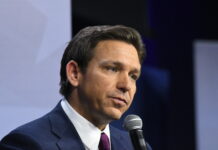An Ankeny parent is concerned about the infusion of “diversity, equity and inclusion” in a course it is difficult to understand the necessity of DEI — band.
“They’re just blatantly teaching DEI (stuff),” they told The Iowa Standard. “They have an entire department. It’s just a euphemism for Critical Race Theory. They’re using band to teach that stuff.”
The problem is taking place at Ankeny Centennial. The DEI Director reportedly spoke to the band class to teach about privilege.
“They also had my child write down in what ways they’ve experienced privilege in their life and they felt really uncomfortable,” the parent said. “They are very confused about all of it because it sounds nice on the surface, but to be honest, it’s just gross. It kind of makes me mad. I thought we were trying to put a kibosh on this kind of crap in our schools in Iowa and it doesn’t seem like there’s any effort to stop it. I didn’t realize how bad it was even in the school that’s right in my neighborhood. You hear about it nationwide, but it’s right here.”
This sheet was read in class by the band teacher, a man called Scott Hook, about a song the band was performing. The song is called “To Right Our Wrongs.”
Here is a portion of the sheet that was read:
“To Right Our Wrongs aims to reflect on the complex, multi-faceted impact that privilege has on the American experience, and on the way that disparities of privilege play a role in both the fight for and prevention of social and systemic equality and equity.
“There is an extensive history of vast systemic violence and injustice towards women, people of color, members of the LGBTQ+ community and other minority groups in the United States. Those who are not a part of these communities and, thus, have not experienced these communities’ discrimination are privileged; if they know about the injustices of our country, it is most likely because they have learned from others.”
The sheet continues:
“But members of these communities must both learn from others and live these injustices. Additionally, this societal privilege is not binary. It is intersectional, meaning that different people experience different amounts of privilege based on the communities they are a part of. A white, cisgender woman is privileged in the sense that she is both white and cisgender; however, she does not have the privilege that men have. A transgender, disabled man does have that privilege; but he, in turn, does not have the privilege held by those who are cisgender or able-bodied. This complex role that privilege plays in the systemic discrimination of our country led me to the guiding questions of this work: What does it mean to work against the wrongdoings of our country’s past and present? How can privilege be utilized for good? As those who hold privilege, what does it mean to right our wrongs?
“A crucial part of the fight for true equality in our country is the utilization of privilege to make an impact on the system, which requires privileged people to be aware of and understand privilege and its meaning. As a privileged person myself in most primary ways privilege presents itself in America (I am white, male, cisgender, and able-bodied), there’s probably little that I can say to those who do not experience these privileges that they have not already learned through their own experiences. I feel that the best thing I can do is to speak to those who are privileged like me, but who lack awareness or understanding of what this means.”
The song combines The Star-Spangled Banner with Lift Every Voice and Sing, the black national anthem.
The following video was shown as well, according to the parent:
“My child told me they don’t want to be thinking about these things at this age,” the parent said. “That’s the whole point. They walk down the hall and they can’t help but feel white guilt when they see other students. That’s the crap that is happening. They’re walking around and all they think about is sexual identity, race, skin color — it’s doing the opposite. It is literally teaching them racism in my opinion. That’s why it makes me so frustrated.”
The Iowa Standard reached out to Hook for comment. He refused to comment, saying he instead would forward the questions to the district spokesperson.


















I’m glad my child has graduated and is no longer in Ankeny schools
[…] You can read about that story here. […]
Thanks for bringing this to our attention. Just because you no longer have kids in school, show up at board meetings and to the superintendent and with others concerned and fight for the kids in YOUR SCHOOL. If you do nothing, evil wins.